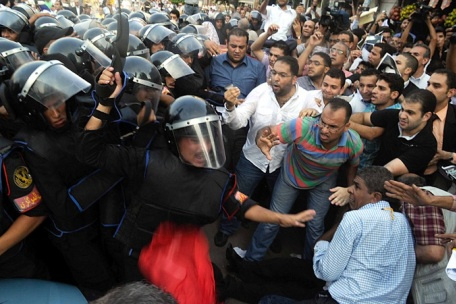The Egyptian generals should listen to the people

The Egyptian people are back in the streets. It is more than five days that they have been gathering in Cairo and other large cities demanding an end to the military rule in Egypt. After months of demonstrations and clashes with the police, finally on February 11, 2011 the Egyptian people succeeded to remove the Mubarak dictatorship with the hope to establish an independent civilian government in which the voice of the masses are truly heard and respected.
Now, after nine months, the people are demonstrating against the same military establishment which was, more or less, neutral during the uprising, allowing the people to express themselves and topple the former regime. Since last Friday, the people of Egypt have been participating in street demonstrations calling for an expeditious end to military rule before the drafting of a new constitution. This time the response from the military is different. The use of live munitions against unarmed civilians has so far resulted in the death of 33 people and injury of more than 1800 others. Despite this brutality, the people have not left the scene and al-Tahrir Square in Cairo is full of demonstrators again.
The ruling generals in Egypt are all appointed by the Mubarak regime. Since the revolution, they have kept their grip on power and have acted strangely on their commitment to transfer power to civilians causing suspicion among the general public. The Supreme Council of the Armed Forces which has ruled since the removal of Hosni Mubarak has called for a political role as the "protector" of the constitution. Furthermore, it has demanded to keep the military budget secret. And worst of all, it has required to have a veto power over the body drafting the constitution.
The generals have had a bad record of performance too. They have retained emergency laws which were initiated under Mubarak. They have been accused of torturing prisoners. They have also kept the notorious Mubarak's state security apparatus almost intact, though it has been renamed.
Fed up with the business as usual of the ruling military, the Egyptian people have called on the generals to step down. Is the ruling Supreme Council ready to listen to the people? Up to now, the generals have harshly dealt with the people. The next week's parliamentary elections will be another test for the ruling military to show their commitment to the transfer of power. It has been alleged that the military has initiated the current crisis in the country to show that the situation is not appropriate to hold the election, apparently fearing from the victory of Islamists, as has been the case in Tunisia. In order to allay any concern about their ulterior motives, the military rulers should prepare the ground for holding the free and fair election next week where the people can elect their true representatives.
It is interesting to note that the United States has not taken a serious stance on the current crisis in Egypt. The U.S. which had continuously supported the Mubarak regime until his last days was instrumental in keeping the military out of clash with the people in the revolution days and in assuring that the situation would not get out of the hands of the generals. The same is true for the Israelis which have enjoyed close relations with the Egyptian military during the Mubarak era and even now.
The rulers in Egypt should understand that they can neither hijack the revolution nor suppress the people's uprising with impunity. Days of ruling by the power of weapons are gone. They should submit to the will of their people before it is too late. At the same time, the U.S. should abandon its double-standard policy and call on the military rulers to step down and allow the Egyptian people to determine their destiny. The regional and international organizations have also a role to play. The Arab League should caution the Military Council that Egypt's membership in the League will be suspended if the military continues to kill the protestors and resists people's demands. The U.N. Security Council should fulfill its responsibility and warn those generals who are engaged in criminal activities that they will be held accountable for their actions.

